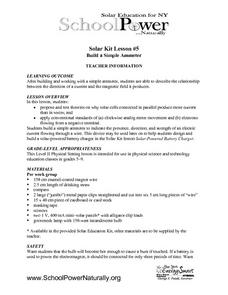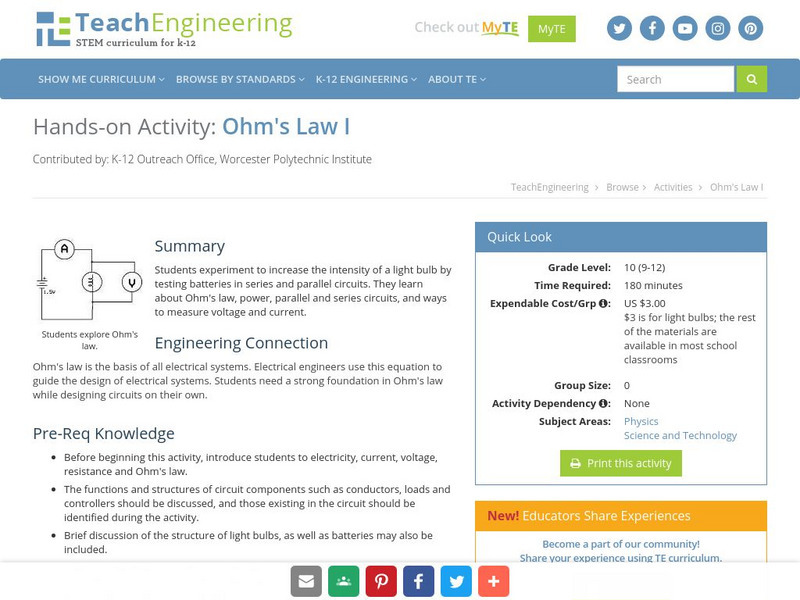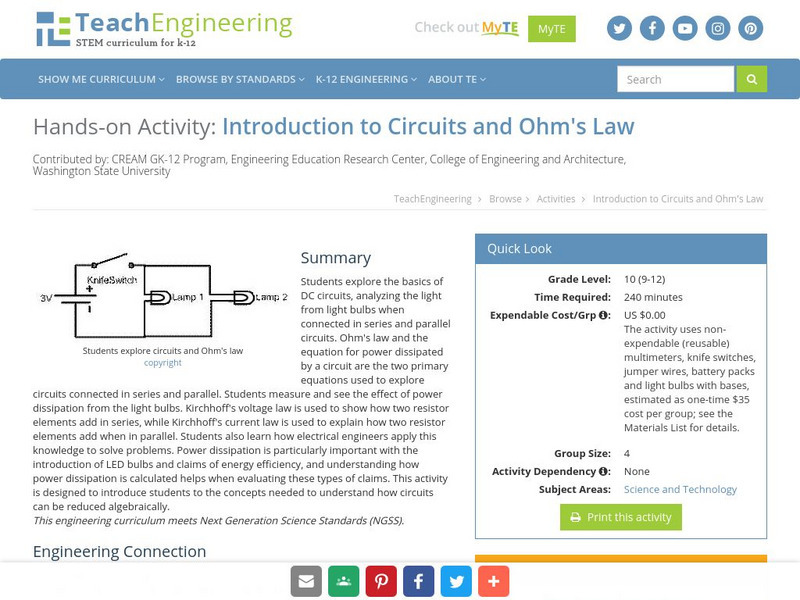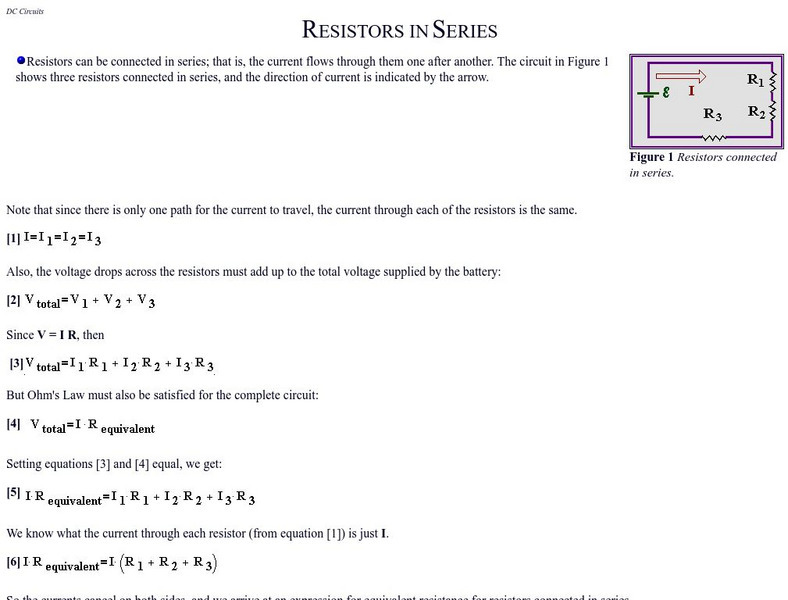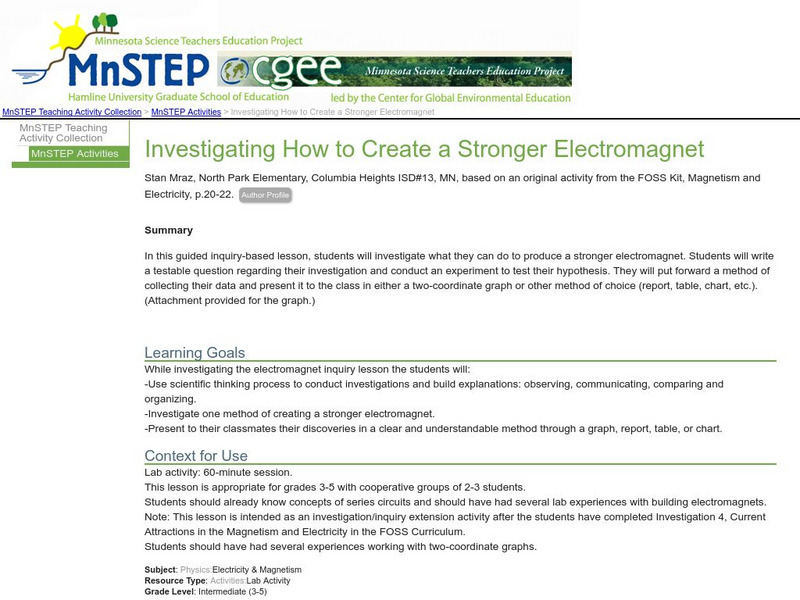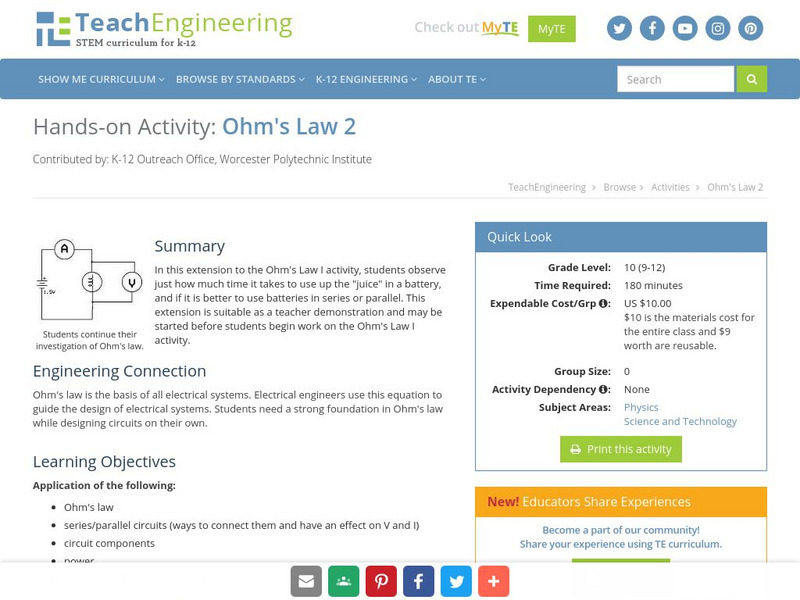Curated OER
Light the Bulb
Students explore electricity. In this power experiment lesson, students determine what is required for lighting a bulb. Students develop an understanding of open and closed circuits, and how energy is formed
Curated OER
V, R, and I in Parallel Circuit
In this V, R, and I in parallel circuits worksheet, students calculate the total current, total voltage, and total resistance. Kids match the correct term with the correct definition. Students also label several diagrams of series and...
Curated OER
What Are Static and Current Electricity?
In this electricity worksheet, students will complete a Venn diagram comparing and contrasting the characteristics of series and parallel circuits.
Curated OER
Series/Parallel Circuits
Learners engage in a lesson plan that is concerned with the concept of series and parallel circuits. They conduct research using a variety of resources. They have class discussion and the lesson plan includes information for the teacher...
Curated OER
Please Turn Up the Lights!
Eighth graders discuss series and parallel circuits and design an investigation to test a hypothesis on total resistance of series and parallel circuits in combination. After discussion, groups design their experiments, run tests, and...
Curated OER
Build a Simple Ammeter
Students build and work with a simple ammeter to test theories on why solar cells connected in parallel produce more current that in series. Students use the ammeter to indicate the presence, direction, and strength of an electric...
Curated OER
Batteries in Series
Eighth graders examine batteries in a series circuit and the associated voltage. They determine, through inquiry and problem solving, that the total voltage of batteries in a series is the sum of the voltage of each battery. They design...
Curated OER
Electrical Circuits - Current & Voltage in Series Circuits
Pupils investigate the relationship between current and voltage in a series circuit. In this physics lesson, students measure the current across each light bulb. They predict what happens to the circuit if one bulb is blows out.
Curated OER
TE Activity: Ohm's Law 2
Pupils study Ohm's Law 2 after completing an activity about Ohm's Law 1. They determine how long it takes to charge a battery. They examine if it is better to use batteries in series or parallel circuits.
Other
Tech Topics: Electricity: Circuits
What is a circuit? How does it work? The animated diagrams and accompanying text will make it easy to understand the concept of circuits!
TeachEngineering
Teach Engineering: Ohm's Law I
Students will work to increase the intensity of a light bulb by testing batteries in series and parallel circuits. It analyzes Ohm's Law, power, parallel and series circuits, and ways to measure voltage and current.
TeachEngineering
Teach Engineering: Introduction to Circuits and Ohm's Law
Students will explore the basics of dc circuits analyzing the light from light bulbs when connected in series and parallel circuits. Ohm's Law and the equation for power dissipated by a circuit will be the primary equations used. Using...
CK-12 Foundation
Ck 12: Resistors in Series and Parallel
[Free Registration/Login may be required to access all resource tools.] The differences between series and parallel circuits are highlighted. Provides an in-depth look at how to solve problems about circuits and resistors. Includes a...
Physics Classroom
The Physics Classroom: Current Electricity: Combination Circuits
Explains what a combination circuit is, reviews the features of series and parallel circuits, and demonstrates how to analyze combination circuits. Includes detailed examples and some problems for students to try. There is also a link to...
University of Guelph
University of Guelph: Physics Tutorials: Dc Circuits: Resistors in Series
Explains and illustrates the meaning of series connections. Discusses the voltage-current-resistance relationships for series connections of resistors. An example problem on series calculations can be accessed from this page.
Science Education Resource Center at Carleton College
Serc: Investigating How to Create a Stronger Electromagnet
In this lesson, students will investigate what they can do to produce a stronger electromagnet. Students will use the scientific thinking process to conduct investigations and build explanations. They will present their discoveries to...
TryEngineering
Try Engineering: Series and Parallel Circuits
The core of this lesson is simple circuits and the differences between parallel and series circuit design. Students perform experiments to test the differences between the two circuit designs using low voltage light bulbs.
Wikimedia
Wikipedia: Series and Parallel Circuits
Wikipedia offers information on two basic ways of wiring components in electrical circuits, series and parallel circuits.
TeachEngineering
Teach Engineering: Ohm's Law 2
This extension to the Ohm's Law I activity, students will observe just how much time it takes to use up the "juice" in a battery, and if it is better to use batteries in series or parallel.
Physics Aviary
Physics Aviary: Practice Problems: Parallel of Capacitors in Series
Determine the total energy stored on a group of capacitors in a combination circuit.
Physics Aviary
Physics Aviary: Series Circuit Lab
This lab is designed to have students investigate the relationships between voltage, resistance and current in a series circuit with up to three passive components. The batteries in this simulation can be varied from ideal batteries to...
Physics Classroom
The Physics Classroom: Electric Circuits: Circuit Connections: Parallel Circuits
When two or more electrical devices in a circuit are connected, it is known as a series connection or a parallel connection. When all the devices are connected using parallel connections, the circuit is referred to as a parallel circuit....
Physics Classroom
The Physics Classroom: Current Electricity: Circuit Connections: Series Circuits
When two or more electrical devices in a circuit can be connected, it is considered a series connection or a parallel connection. When all the devices are connected using series connections, the circuit is referred to as a series...
CK-12 Foundation
Ck 12: Parallel Circuits
[Free Registration/Login may be required to access all resource tools.] In this lesson, students learn about parallel circuit design, and how to calculate equivalent resistance from resistors in a parallel circuit.







